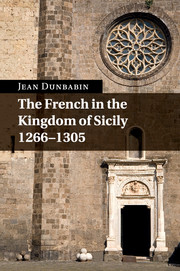Book contents
- Frontmatter
- Contents
- Acknowledgements
- List of abbreviations
- Genealogical tables
- Introduction
- Part I Means of communication
- Part II Indirect channels of communication
- Part III Settlers in the Regno
- Part IV Cultural and political impacts
- 10 Royal ideology: the saintly family
- 11 Religious politics and practices
- 12 The universities of Naples and Paris
- 13 Medicine and science
- 14 Law
- 15 Administrative practices
- 16 Navy and army
- 17 Literature
- Epilogue: spurs to remembering
- Conclusion
- Bibliography
- Index
13 - Medicine and science
Published online by Cambridge University Press: 03 May 2011
- Frontmatter
- Contents
- Acknowledgements
- List of abbreviations
- Genealogical tables
- Introduction
- Part I Means of communication
- Part II Indirect channels of communication
- Part III Settlers in the Regno
- Part IV Cultural and political impacts
- 10 Royal ideology: the saintly family
- 11 Religious politics and practices
- 12 The universities of Naples and Paris
- 13 Medicine and science
- 14 Law
- 15 Administrative practices
- 16 Navy and army
- 17 Literature
- Epilogue: spurs to remembering
- Conclusion
- Bibliography
- Index
Summary
Medical knowledge in the middle ages was never contained within the walls of universities, despite earnest attempts by graduates in medicine to pour scorn on the qualifications of all those who had not attended a university. The gap was considerable between the more theoretical knowledge acquired from a study of Galen and Hippocrates in Salerno, Bologna, Montpellier or Paris and the cures handed down from generation to generation of wise people in the countryside. Yet a certain fusion between the two had occurred among Arabic-speaking physicians in the Abbasid empire, and western Europe came to benefit slowly from Arabic works in the high and late middle ages. Southern Italy and Sicily played a crucial role in the translation of these Arabic works into Latin and their transmission to other centres of medical learning. As an illustration of this from just prior to our period, King Manfred commissioned a translation into Latin of Ibn Botlân's treatise on health at some point during his reign (1258-66). Known in the west as Tacuinum sanitatis, it was glossed in Paris by the French physician Jean de Saint-Amand before he left there in 1298. Knowledge therefore travelled reasonably fast. It would be a distinct exaggeration to claim that the Angevin invasion of southern Italy created a flow of medical knowledge from the Regno to northern France. A trickle and sometimes more had been in existence at least since the days of Constantinus Africanus in the eleventh century, and probably from well before that time.
- Type
- Chapter
- Information
- The French in the Kingdom of Sicily, 1266–1305 , pp. 228 - 234Publisher: Cambridge University PressPrint publication year: 2011

